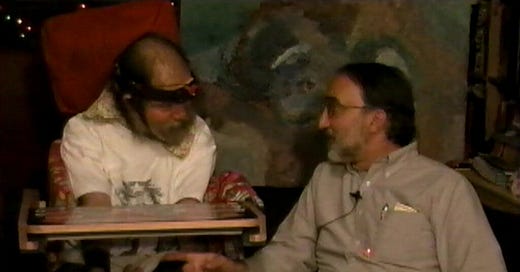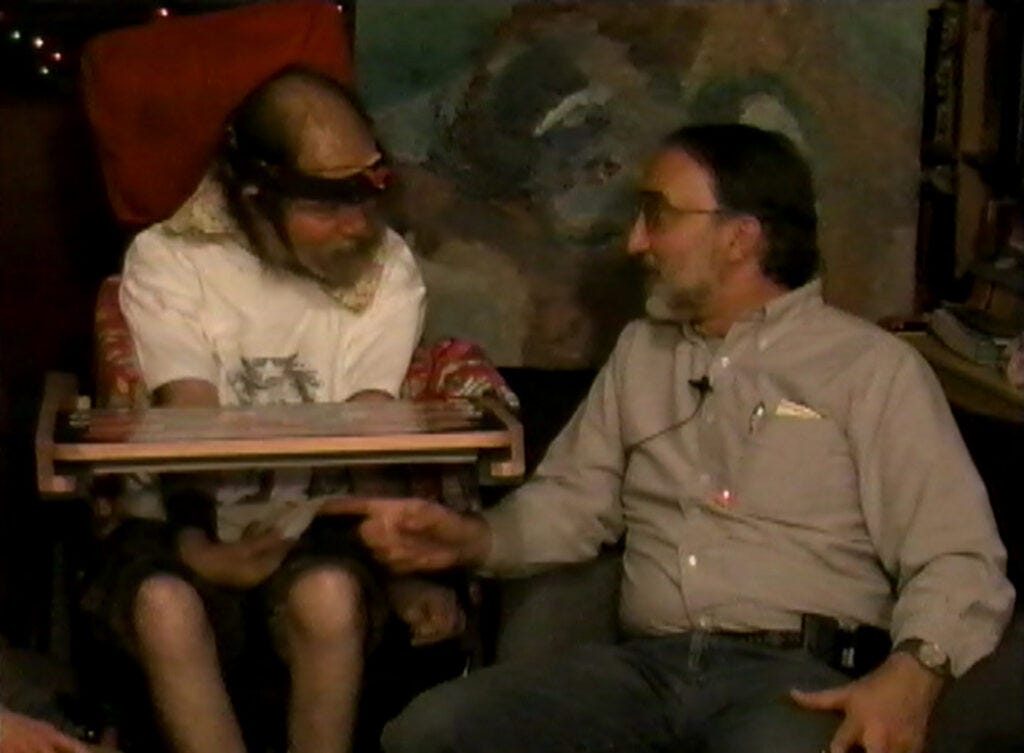Dr. Richard Kerbavaz - Deep Conversations in the Shaman’s Den
How to Reform the Health Care System
Recorded May 2, 2008 on luver.com
“Kerbavaz is a rare guy! He knows practically everything, enjoys life/people, and is available!” – Frank Moore
Frank first met Dr. Rich Kerbavaz when Frank was a patient at Rockridge Medical Group in the early 1980s. Twenty-five years later, they had become dear friends, Frank was running for president of the U.S., and Rich came over to discuss Frank’s health care plan and to compare it with the plans of the “major” candidates.
Two years later, Frank went into the hospital for a routine operation, and instead spent six weeks in intensive care, and almost died. Rich Kerbavaz was there following Frank’s care, and was his unfailing advocate. Frank said, after surviving this hospital experience, that if he did not have Rich, who was “willing to go against the prevailing expectations, it would have been much harder for me to beat the curse of their expectations, judgments, projections.” This gives you an idea of who Rich Kerbavaz is.
With 30 years as a highly respected ENT doctor and surgeon, Rich knew the medical and medical insurance systems. In this interview Rich and Frank work together to develop an alternate, more humane model for health care in this country.
(Frank’s complete presidential platform can be found here)
Below is an excerpt from the book, Deep Conversations in the Shaman’s Den, Volume 1.
Frank: … is what they don’t want.
Richard: Ah, the bigger cross-sections kind of things.
Linda: Gathering together like that.
Richard: Yeah. I guess there is a certain amount of just resistance to having any kind of a gathering at this point.
Linda: Yes, it seems so.
Frank: Other than corporate-sponsored events.
Richard: Yeah. And that’s OK. But if it doesn’t have that kind of sponsorship and a narrow goal that they can justify somehow, they don’t want it to happen. I think the fear is loss of control. And it’s just sort of the issue of controlling a lot of actions and behaviors.
Frank: I think that they is a big part of why we don’t have universal free health care.
Richard: Ah, what a segue! (laughing) Good point, good point.
Frank: The rich don’t want to be in the same system as the rest.
Linda: As the unrich.
Richard: And there’s just a lot of obstacles or things that keep getting thrown up that are just not really true, but are the way people believe or the way people react to things. It’s really interesting in all the big surveys, if you just ask Democrats the question about some sort of health plan or national health plan, it’s overwhelmingly popular. And if you ask Republicans the same questions, it’s overwhelmingly negative. And if you phrase the exact same question the same way to two different groups it just is totally polarized. It’s very interesting. At almost every level asking it, whether they’re in favor of a plan or opposed to the plan or whether they think it would be good for them or good for the country … there’s all these different … the same kind of a survey’s been done a half a dozen times and each time they ask slightly different questions, and it still comes out a big divide right along party lines! And those who are not declared in either major party, it sort of splits 50/50. So it’s interesting.
Frank: Why is that?
Richard: I think that it’s just how people frame the internal discussion or the internal dialogue. They’re using their political filters to look at a bigger issue. And so it’s a threat in some way to the Republican party or to the Republican … the people who support the Republican party. And so people who are either a little bit more liberal or more of a Democrat, more of a social Democrat or aren’t really involved with any organized party, tend to be in favor of the universal health plan. And that’s across the board, however you ask the question.
Frank: Like if the rich were in Medi-Cal, Medi-Cal would get better fast.
Richard: Yeah, it would. (laughing) It would make a big difference. Actually, the ones that you want to get in Medi-Cal are the politicians. (laughing)
Frank: Because they would not stand for it.
Richard: No, they wouldn’t stand for those kinds of things. And clearly they would not be eager to keep doing all the cuts that they seem to keep doing now to the Medi-Cal program. Just every year, anytime there’s any kind of a budget crunch, the first thing that goes is health care! The easy thing … actually there was another survey not too long ago that, in California, people were more in favor of cutting health care than cutting K through 12 education. I’m not sure exactly how they asked the question, but there was more support in the budget crunch time of cutting health care than cutting educational expenses. Tough choice, but nobody was really eager to raise taxes.
Frank: (making sounds) It is not really a choice. We need both.
Richard: Yeah, right, right. And then the trick is coming up with some sort of a funding mechanism that’s a little more fair across the board. Which is one of the things that’s nice about some of the tax proposals that you put out there, is that it eliminates a lot of the very strange, skewed tax codes that we have now and tries to make it a little more fair to everybody.
Frank: And the 7 …
Linda: The 75% tax over $1 million per individual and $5 million per corporation …
Frank: Would take the greed out of the picture.
Richard: Right, right. And that would be a very good thing to do as well. ’Cause clearly we’ve got an awful lot of issues at the very top. That most of the people who make that kind of money aren’t paying taxes, at all! They manage to find shelters for everything. So where’s the justice in that, where the bulk of the tax burden is being carried by the middle class.
Frank: But I get: that is discrimination.
Linda: That’s what you get? Yeah, that’s what people criticize: that he’s discriminating with that.
Richard: Discriminating against the wealthy?!
Linda: Yes.
Richard: (laughter) Interesting concept.
Linda: And I’m sure it’s not rich people saying that, either.
Richard: That’s an interesting concept. That there are … I guess there are enough people that aren’t in that tax bracket or in that income bracket who want to be, but they view it as a threat to their dreams or their aspirations, somehow.
Frank: But they don’t see box seats as discrimination.
Richard: That’s an interesting point. (laughter) Well, you see, box seats are to give them something, and taxes takes something away.
Frank: And the rich need some perks (laughter) to be rich.
Richard: (laughing) That’s true! Otherwise you stop being rich! It’s terrible! It ruins the whole point! So maybe what you should do is just allow that for everybody who’s in that tax bracket, that they get a box seat some place. (laughter)
DOWNLOAD THE COMPLETE INTERVIEW HERE (PDF)
How To Reform The Healthcare System
Recorded May 2, 2008.
Rich was Frank’s ENT doctor for over twenty years who became a dear friend.
Frank called Rich one of his favorite people to be with.
This is the third time that Rich Kerbavaz was a guest on The Shaman’s Den. This was during the time that Frank was running for President of the U.S. He asked Rich to come on the show this time as a doctor who knew the medical system to compare Frank’s healthcare plan to the other major candidates at that time. This is the chart that we used on the show:
Compare Frank’s healthcare plan to those of John McCain, Barack Obama and Hillary Clinton http://frankmooreforpresident08.com/healthcare-grid.htm
Btw, Rich also took us on his yacht to help spread the word of the Campaign. What a fun adventure that was!!!
Presidential Campaign Cruise http://frankmooreforpresident08.com/slideshows/cruise062008/sfbaycruise-062008.html More Frank Moore’s Shaman’s Den shows: http://eroplay.com/underground/shamansden.html




